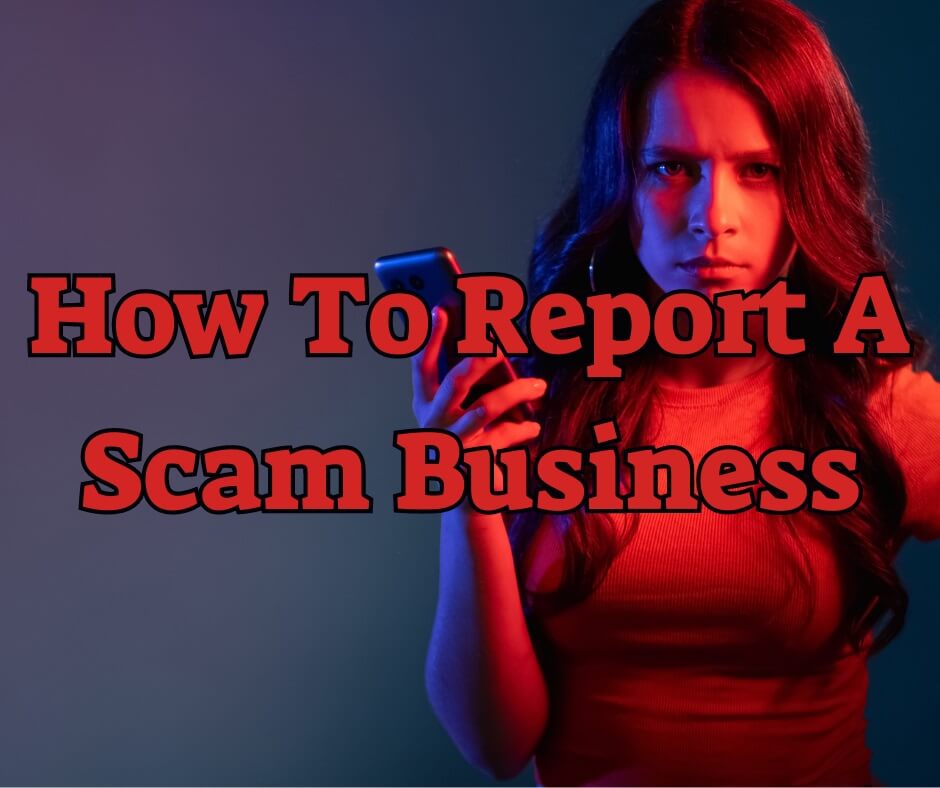In our rapidly evolving digital landscape, it’s easier than ever for scam businesses to proliferate and prey on unsuspecting victims. Deception can come in many forms, from fake investments and pyramid schemes to counterfeit products and false advertising. But there’s no need to feel helpless in the face of such fraud. Today, we will explain how to report a scam business, highlighting essential steps to take, agencies to contact, and ways to protect yourself and others in the future.

Identifying a Scam Business
Before diving into how to report a scam business, it’s crucial to know how to identify one. Some common signs of scam businesses are:
- a lack of transparency
- unrealistic promises
- pressure tactics
- inconsistent contact information
They may also have an unusually high number of negative reviews or no online presence at all.
Collect Evidence
If you suspect you have come into contact with a scam business, the first step is to gather as much evidence as possible. This could include emails or messages, website URLs, receipts, contracts, or any other relevant documents.
Remember, the more information you can provide, the more effective your report will be.
How To Report A Scam Business to Authorities
Once you’ve gathered all the necessary evidence, you’ll want to report the scam business to the appropriate authorities. These may vary based on your location and the nature of the scam.
- Local and State Agencies: Start by reporting the fraud to your local and state consumer protection offices. They can provide valuable advice on how to proceed and may launch an investigation if they find your claim to be valid.
- Federal Trade Commission (FTC): In the United States, you can report scam businesses to the FTC through their online complaint assistant or by calling 1-877-FTC-HELP.
- Internet Crime Complaint Center (IC3): If the scam occurred online, the IC3, a partnership between the Federal Bureau of Investigation (FBI) and the National White Collar Crime Center, allows you to submit a complaint.
- Better Business Bureau (BBB): The BBB also accepts reports about scam businesses and publishes them in their database, alerting other consumers about potential fraud.
- Action Fraud: For those in the UK, Action Fraud is the national reporting center for fraud and cybercrime. You can report a scam business through their online reporting tool.
After You Report A Scam Business
Knowing how to report a scam business is vital, but what happens after you file a report is just as crucial. After submitting your report, you should also alert your bank or credit card company if any financial transactions were involved. They can help secure your accounts and may be able to reverse fraudulent charges.
Moreover, if you were victimized by an identity theft scam, consider monitoring your credit reports closely for any unauthorized activity. You may also want to invest in identity theft protection services for added security.
Recovering Your Money
When you fall victim to a scam business, especially one involving cryptocurrency transactions, seeking help from a cybersecurity company, such as CNC Intelligence, can make a world of difference.
Cryptocurrency, by nature, is pseudonymous and highly encrypted, making transactions difficult to trace. While this is part of its appeal for legitimate users, it’s also a boon for scam businesses, who can hide behind these complexities to evade authorities. However, cybersecurity companies have the expertise to trace these transactions and identify patterns that can lead to the scammer’s identity.
Get in touch with our affiliated Cryptocurrency Forensic Specialists at CNC Intelligence for free by filling out the form below.
Not only do these companies have the technical know-how to track cryptocurrency transactions, but they also have experience liaising with lawyers and law enforcement agencies. This collaboration can expedite the process of reporting and recovering funds from the scam business. The cybersecurity firm can present technical evidence in a way that’s understandable to legal and law enforcement personnel, strengthening the case against the fraudsters.
Moreover, these companies can help protect you against future scams by identifying vulnerabilities that were exploited and offering solutions to mitigate these risks. Therefore, reporting a scam business to a cybersecurity company is not just about seeking retribution; it’s also a crucial step toward preventing further victimization.
Educate Yourself and Others
After learning how to report a scam business, the next step is to educate yourself and others. Familiarize yourself with common types of scams to recognize red flags quickly. Share this knowledge with your friends, family, and community to help them avoid becoming victims.
Scam businesses rely on deception and the lack of awareness among consumers. By reporting them and spreading awareness, we can all play a part in reducing their influence and protecting our communities.
In conclusion, if you suspect a scam business, don’t hesitate to take action. Gather all the necessary evidence, report it to the relevant authorities, secure your financial information, and spread the word. While it may seem like a daunting process, knowing how to report a scam business can help protect you and countless others from falling
If you have been scammed online, please share your experience with us by leaving a comment below.
If you lost money to online scams, make sure to get a free consultation with one of our recommended scam recovery companies.
When you comment, your name, comment, and the timestamp will be public. We also store this data, which may be used for research or content creation in accordance with our Privacy Policy. By commenting, you consent to these terms.
